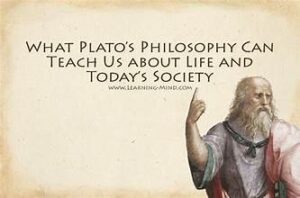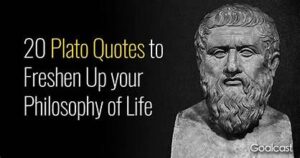
Plato, one of the most influential philosophers of ancient Greece, continues to shape modern philosophical thought with his profound ideas and theories. His contributions transcend time, influencing a broad spectrum of philosophical discourse. This article explores how Plato’s wisdom endures in contemporary philosophy, shedding light on the relevance of his ideas in today’s intellectual landscape.
Plato’s Philosophical Legacy
Plato, a student of Socrates and teacher of Aristotle, made significant contributions to Western philosophy through his dialogues and philosophical writings. Central to his philosophy are his ideas on justice, the ideal state, and the nature of reality. His most notable work, “The Republic,” outlines his vision of a just society and explores the concept of justice in a political context. Plato’s Theory of Forms, presented in works like “Phaedo” and “Symposium,” posits that the physical world is a mere shadow of a higher, unchanging reality composed of abstract forms.
Influence on Modern Philosophy
- Theory of Forms and Metaphysical Inquiry
Plato’s Theory of Forms remains a cornerstone of metaphysical inquiry. This theory posits that non-material abstract forms, and not the material world, possess the highest and most fundamental kind of reality. Modern philosophers continue to grapple with the implications of Plato’s ideas on the nature of existence and reality. The quest to understand the essence of concepts, like beauty, justice, and equality, reflects Plato’s enduring influence.
- Epistemology and Knowledge
Plato’s contributions to epistemology, particularly through his Allegory of the Cave, illustrate the philosopher’s thoughts on knowledge and perception. The Allegory presents a metaphor for human enlightenment and the pursuit of truth. In contemporary philosophy, this allegory is frequently referenced in discussions about perception, knowledge, and reality. Philosophers explore how our understanding of truth and reality may be limited by our experiences, echoing Plato’s insights.
- Political Philosophy and Justice
Plato’s ideas on justice and the ideal state, outlined in “The Republic,” have profoundly influenced modern political philosophy. His vision of a philosopher-king and the tripartite structure of the soul have been the subject of extensive analysis and debate. Contemporary discussions on political theory, justice, and governance often draw from Plato’s framework, examining the balance between individual rights and the common good.
- Education and the Role of the Philosopher
Plato’s Academy, one of the earliest institutions of higher learning, underscores his belief in the transformative power of education. His educational philosophy emphasized the development of critical thinking and the pursuit of knowledge. Modern educational theories and practices often reflect Plato’s principles, advocating for education as a means to achieve personal and societal improvement.
- Influence on Ethics

Plato’s dialogues often delve into ethical questions, exploring the nature of virtue and the good life. His ideas on the moral dimensions of human behavior continue to influence ethical theory today. Contemporary ethicists and moral philosophers frequently engage with Plato’s thoughts on virtue, morality, and the nature of a good life, reflecting his lasting impact on the field.
Plato’s Relevance in Contemporary Debates
Plato’s influence extends beyond traditional philosophy into areas like political science, education, and ethics. His ideas provide a framework for understanding complex contemporary issues, such as the nature of truth in a post-truth era or the role of morality in modern governance.
Modern Interpretations and Critiques
Modern philosophers often revisit Plato’s ideas to address contemporary issues. Some critiques challenge Plato’s views on the nature of reality and the role of ideal forms, while others build upon his theories to develop new philosophical insights. This ongoing dialogue highlights the dynamic nature of Plato’s influence, adapting his ideas to address the evolving landscape of modern philosophy.
Plato in Popular Culture
Plato’s ideas also permeate popular culture, from literature and film to political discourse. His Allegory of the Cave, for instance, has inspired numerous adaptations and interpretations in various media, illustrating the broad reach of his philosophical insights.
Conclusion
The wisdom of Plato endures in modern philosophy through its profound influence on metaphysical, epistemological, political, and ethical thought. His ideas continue to shape contemporary debates and philosophical inquiries, reflecting the timeless relevance of his contributions. As philosophers and scholars navigate the complexities of modern intellectual challenges, Plato’s legacy remains a guiding light, illuminating the path of philosophical exploration and understanding.

